Salamanders: Rebirth Read online
Page 7
‘Defend us.’
Makato led them inside without further preamble. He had already decided he would fly the craft himself and once aboard quickly got strapped in to the pilot’s station and commenced start up protocols.
The others filed in after him, Jedda in front, and likewise strapped themselves in to the crew compartment. Each man checked the rebreather and function of the atmosphere suit to the man on his left. Once satisfied, Jedda gave the signal for the launch to commence.
Seeing that the enginseer and Thallax were also now aboard, Makato began ignition. Through the lighter’s glacis, he saw the amber lumens around the launch portal turn to green as he provided the requisite launch codes. The landing strip was lit. He boosted the shuttle’s engines and fired up into launch. Eight seconds and they had cleared the landing strip and emerged from one of the aft launch ports into the void.
Twenty-three kilometres in front of them loomed the dark and lightless shape of the stricken destroyer.
As he made course for the massive vessel floating listlessly through space, Makato found it hard not to think of it as a tomb. He was no coward, far from it. Makato had served with the Imperial Navy for almost a century, and was considered a veteran. But deep down in his marrow, he prayed for the ship to be empty and that nothing was lurking aboard.
A damaged fighter bay allowed the Arvus untrammelled access to the Hunter-class vessel. Within seconds of touching down onto an ice-bitten, debris-strewn deck it was obvious that atmospheric conditions aboard had been severely compromised. Mag-locking the landing stanchions of the lighter, Makato lowered the ramp and gave the order to disembark.
The Thallax led them out, its targeting matrix hazing the zero atmosphere of the deck. Engaging luminator banks on its chest carapace, it spread a thin wash of magnesium-bright light over the void-dark interior.
‘I am no expert, sir, but I’d hazard this bay has been damaged by a torpedo impact,’ said Jedda through the contrivance of his atmosphere suit’s vox. He cast his own lamp pack over the expansive deck, made larger by depressurisation and the subsequent evacuation of all men and materials not bolted down. Evidence of fires rapidly extinguished could be seen marring some of the walls, which were also riddled with tiny craters the size of Makato’s fist.
‘Some kind of fragmentation warhead…’ he posited out loud, ‘shredded the whole deck.’
Each man had locked his boots with a moderate magnetic charge. Enough to hold on but not so much that he could not advance. As an additional safety precaution, Makato had insisted each man be tethered to another. If one experienced magnetic failure, the other would anchor him down until further help could arrive.
Only Utulexx went without, trusting to the manifold apparatus of his cybernetic implants to keep him grounded. The Thallax had its own terrain adaptive systems that included void combat. It could have traversed the outside of the ship if so commanded.
‘Sergeant,’ the enginseer began, using voice amplification and modulation to be heard by the atmosphere-suited humans, ‘I have located a route further into the ship.’
Makato turned, slowed by the lack of gravity, and saw the access port Utulexx was referring to.
It looked like a maintenance hatch, a crawlspace just wide enough for the Thallax if it was crouched down. The rest of them should not have any trouble, and there was no way their plasma-cutters were going to get through the larger gates and sealed bulkheads that had come down, too late it seemed, to seal off the launch bay.
‘Make it safe, enginseer. We’ll proceed in that direction.’
Utulexx nodded and with a blurt of binaric cant sent the Thallax up to take point.
At Makato’s order, Jedda brought up two armsmen with plasma-cutters.
‘Make it quick,’ he voxed.
Six minutes and they were through the hatch and into the corridor beyond. During that time, Utulexx scanned for life signs but found nothing.
The Thallax would have been compromised in the narrow access corridor, so Jedda went in first with his carbine primed. It was snub-nosed and compact, perfect for boarding actions. At close range, Jedda was confident of its stopping power.
On one wall in the eight-metre corridor was a cogitator panel. Utulexx force-accessed it using his mechadendrite implants and gained access to some of the ship’s onboard systems. First he rebooted the life support, which had been inexplicably suspended, then used what little emergency reserves remained to provide minimal lighting and motive power to some of the lifters. He then sealed the maintenance corridor behind them with a secondary blast gate that dropped down from the ceiling. Yellow lumens in both walls flickered once and stayed on. The light was weak, but at least it was lit and better than abject darkness. A hissing sound presaged re-oxygenation and in just over eight minutes the corridor and the immediate section of the ship beyond it – a small maintenance deck – was habitable again.
The corridor was wide enough for two abreast, so Jedda and Makato were shoulder to shoulder when the exit hatch opened and admitted them deeper into the ship.
Jedda went first, breathing slow and steady through his respirator, blowing out gusts of carbon dioxide through the filtration vents at the sides of his mask. He moved low and stealthy, almost feline, the carbine tucked into his shoulder and panning across the deck.
Like the rest of the ship, it was deserted. Squalls of mist ghosted across the floor, obscuring it from view. Lamp packs still flickered as they tried and failed to maintain a consistent link to the ship’s recently resupplied emergency power. In the half-light, they saw chains hanging from a vaulted ceiling. A swaying phosphor globe sporadically illuminated a squadron of power-lifters, their cabs bowed down as if in reverence, lifter arms hung slack by their sides. No crew, though. There were no bodies anywhere, only crates and laid down tools.
Advancing close on Jedda’s heels, Makato paced out the deck in his mind. He guessed two hundred and sixty metres. Definitely a sub-deck, but the lifter tube at the end of it would grant them further access. He reasoned that any survivors still on board would either be on the bridge or in life support.
According to Utulexx’s scans, this meant heading upwards to the higher decks.
Roughly halfway across the maintenance deck, Makato clenched his fist then raised it to order an all-stop. The boarding party were moving in a column, and there was plenty of space between them and the shadowy confines of the wider deck either side.
‘Enginseer, I’m reading some temperature fluctuations.’
‘The ship is still normalising its environment,’ Utulexx replied, his Thallax watchdog standing dutifully over him.
‘Are we safe to remove respirators?’ Makato asked. They were fouling his peripheral vision, and if the ship was atmospherically stable from this point, he would prefer to be without the handicap.
Utulexx took a few seconds to collate and assess the data from across the activated decks.
‘You may disengage atmospheric redundancies, sergeant.’
Makato unclipped the dome-like glacis from his head and removed it along with his respirator. The air smelt stagnant, still in the early stages of filtration and recyc but at least it was air.
Jedda and the others did the same, breathing deeply and relieved to no longer be stifled by their masks. They still needed the suits, however. Temperature levels were sub-zero and clouds of low-lying coolant still thronged some parts of the deck, encrusting stanchions and gantries with artificial hoarfrost.
Pulling a data-slate from a pouch in his atmosphere suit, Makato said, ‘According to this, we can take the lifter up three levels and come out in cryogenics. If there’s anyone still alive on this ship, that’s where they’ll be.’ He tapped the slate and the haptic implant in his glove blanked away the schematic and transferred it to a retinal lens independent from the suit itself but worn by Makato in a circlet around his head. The rectangular lens was t
ransparent and flicked over his right eye where it displayed the schematic layout of the ship and superimposed it over his current destination. Now he had a living map of their route to cryogenics.
Thusly prepared, he moved the column out again.
‘How many saviour caskets does a vessel this size have?’ he asked Utulexx, who consulted his datacore for the answer.
‘Between three and five hundred, intended for essential personnel only.’
Makato nodded.
‘So there could be as many as five hundred souls up there?’
‘With the amount of damage this ship has sustained, the amount of time it could have been adrift in the void, I would posit that number to be significantly less.’
‘But five hundred at most?’
‘Potentially, yes.’
Makato began to wonder if he had brought enough men. Too late now. He decided they would get to cryogenics, assess the situation and then determine if further rescue teams were needed.
They crossed the remainder of the maintenance sub-deck without incident. The lifter was large enough to accommodate the entire team, so they went together. After three decks, they reached cryogenics.
As the gates to the lifter opened, a long corridor was revealed, stretching away into half-darkness. Two other corridors lay either side of it, but were only accessed through the central aisle, making five in total. Makato’s schematic showed each corridor had two rows of fifty cryogenic saviour caskets. This was the ship’s cryo-vault and, according to its chrono-stamp, it had not been accessed in several days.
Five hundred souls. Alpha through epsilon, with the main access corridor marked as gamma.
As they stepped from the lifter and onto the deck threshold, it became clear that not all of the caskets were functional. Some were broken, the activation lumens within dark and non-operational. Each casket was identical, arranged vertically and shaped like a glass cocoon mounted to a power generator slaved to the cryo-vault’s power array. They were large too, large enough to accommodate a human host with ease. Pipes and tubes fed nutrients and maintained hydration. A simple face mask rebreather provided oxygen. During cryo-sleep, a host should want for nothing and be left to dream. But some of the inhabitants lodged in this ship’s cryo-vault had been anything but quiescent. Closer inspection revealed that most of the caskets were empty but some contained desiccated, even skeletal, remains of human crew.
None of these men or women had died well.
Jedda made the sign of the aquila as Makato led them down the main access corridor. Lamp packs stabbed into the darkness, shining into each casket, as their bearers checked for survivors.
‘The long sleep…’ said Makato, trying not to imagine waking from cryo-stasis locked inside one of those caskets, unable to breath, barely able to move, slowly freezing to death as the process of vitrification broke down. The terror-etched faces staring hollow-eyed back at him made it hard to refute the image. Hands curled into claws, scratching ineffectually at glass. Fingertips blue with cyanosis. Lips peeled back over ice-rimmed jaws and teeth, mouths outstretched in silent expressions of fear and anguish…
‘Something very bad happened here,’ Jedda murmured. It was the first sign of internal doubt he had shown since mission start.
Makato found he could not argue, so said the only reassuring thing he could think of, ‘Whatever went wrong and condemned these poor souls to a cold death has passed. Stay vigilant.’
They moved slow, two by two with one man as rearguard.
The air was chill, and getting colder by the second. Their breath ghosted in long, white plumes of exhalation. The hard deck clanked underfoot with every booted step.
Nothing on the schematic.
‘Are you getting any bio-signs, enginseer?’
Makato had left Utulexx and the Thallax at the entryway, where a command console was linked to all five hundred caskets.
‘The ship’s entire complement of cryogenic stasis caskets has been activated. None are registering life signs but the control functions of this facility have been compromised.’
‘Compromised?’
Makato, Jedda and his men were reaching the end of the first bank of caskets. Frost crusted their boots from the expulsion of cryogenic gas leaking from several damaged units that crept across the floor in a white fog.
‘Sabotaged,’ Utulexx replied. ‘Cryo-freezing should not be able to occur if a unit is damaged or its hermetic seal has been breached. This facility is currently violating that protocol.’
Hence the air, and the frost underfoot.
Makato gripped a support stanchion of one of the caskets to test it. The metal cracked and split with only a minor application of force. Shortness of breath, acute headache and nausea: Makato did not need to be a medicus to recognise the early stages of hypoxia.
‘Helmets on,’ he ordered, feeling his skin start to prickle.
Encased by the domed glacis, Makato experienced a stifling of his senses but the temperature readout on the glass and the increased nitrogen in the air’s composition suggested some minor factional distillation had occurred with the large-scale release of several broken caskets. Prolonged exposure would be harmful to both him and his men.
At the end of the first bank they had discovered sixteen operational caskets, another twenty without power and fourteen with hermetic breaches spilling out cryo-gas into the localised atmosphere. Eight had been occupied by members of the crew. All were dead, their stasis arrested or having failed completely.
Four more banks awaited them, but Makato was growing impatient. As a Navy veteran, he had learned to trust his instincts. Here they were telling him to perform whatever due diligence he needed to in the cryo-vault and then get himself and his men off the ship.
‘Jedda, split your men into two teams and have them cover the port-facing caskets. I’ll take the starboard.’
Jedda nodded and went to his task.
Makato went right. Before heading down the next bank of caskets, he checked the load of his carbine; there was frost occluding the ammo gauge and he had to wipe it with his glove several times before it cleared. He had yet to fire it, so he knew the weapon held a full charge but the sight of the flashing readout was absurdly reassuring.
‘Enginseer, any life signs?’
‘Still none, but I am reading increased heart rate and respiration in your biorhythms, lieutenant.’
‘I’m fine, just keep your attention on the cryo-vault. I don’t want any surprises.’
The next bank of cyro-caskets was dark and what little light that came from the deck lamps underfoot was obscured by the vaporous atmosphere created by the leaks. About halfway down the corridor, one of the caskets spewed thick gouts of freezing mist into the air from a ruptured pipeline. It was hard to tell in the conditions, but the cable looked as if it had been cut.
Giving each casket a cursory examination now, as he subconsciously increased his pace, Makato edged past the badly damaged cryo-unit. As he emerged into the latter half of the corridor, a thought occurred to him.
‘Enginseer, what purpose would deliberately flooding the cryo-vault with aerosolised nitrogen serve?’
It took a few seconds for Utulexx to respond. During the short pause, Makato caught the sound of Jedda’s voice through the muffled confines of his helmet. He was about to raise the armsman on the vox when Utulexx replied.
‘Other than to create a hypoxic atmosphere, I can think of only one: the obfuscation of genuine active bio-signatures within the vault.’
Makato’s grip on his carbine intensified, and his pace slowed as his heart rate increased. Each casket was an empty void, most were unlit. The billowing pipeline behind him created a soft, dulcet refrain that scraped his nerves rather than eased them.
‘Explain.’
‘If an infiltrator wanted to hide their presence from a rudimentary bio-scan,
a cryo-vault with a compromised structural integrity would be the optimum location to achieve that.’
‘Meaning, the drop in temperature would effectively make them invisible?’
‘Precisely.’
‘What about the effects of prolonged exposure?’
‘In most cases that would result in decreased motive and cognitive function, concluding in death.’
Most cases.
Makato wanted to hail Jedda. He wanted to recall his men, but the next cryo-casket in line was frosted with recent activation, the glass almost impossible to see through. Almost impossible. Something loomed behind the glass. It was large.
‘Lieutenant,’ Jedda’s voice came over the vox. ‘We’ve found something…’
Makato was only half listening as he reached out a gloved hand to wipe away the hoarfrost obscuring his view.
‘You said most cases. What could survive in conditions like that?’ he asked Utulexx, whilst simultaneously smearing away the frost on the outside of the casket, creating a half-horseshoe window of clear glass through which to observe…
‘Only a transhuman subject could survive in a nitrogen-saturated environment for any length of time.’
…power armour.
‘Emperor’s blood…’ gasped Makato, and backed away. From the opposite end of the cryo-vault he heard smashing glass and the shouts of Jedda and his men. Energised carbine discharges followed in a high-pitched whine.
‘Who is firing?’ Makato demanded. ‘Jedda, report!’
Jedda’s reply was swallowed up by more las-discharge and panicked shouting.
Makato dared not turn his back on the cryo-casket. In his peripheral vision, which was limited within the dome of his helmet, he saw a second casket was similarly occupied. In the one directly in front of him, something was moving.
Power armour… It took him a few seconds to make the connection.
Through the gap in the frost, Makato saw the casket occupant’s eyes open. They were black, like pools of oil.
‘Enginseer, we’re in trouble. Activate the Thallax.’

 Heralds of the Siege
Heralds of the Siege The Lightning Golem
The Lightning Golem Stitches
Stitches Promethean Sun
Promethean Sun KNIGHTS OF MACRAGGE
KNIGHTS OF MACRAGGE Tales of Heresy
Tales of Heresy The Great Betrayal
The Great Betrayal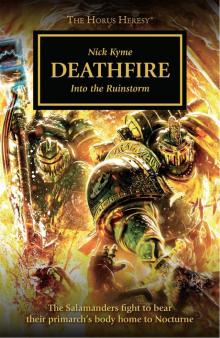 Deathfire
Deathfire Sherlock Holmes--The Legacy of Deeds
Sherlock Holmes--The Legacy of Deeds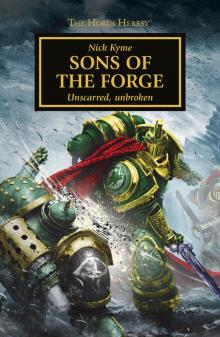 Sons of the Forge
Sons of the Forge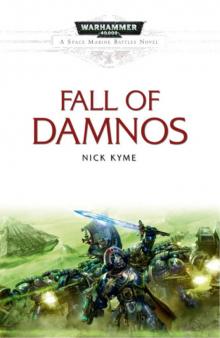 Fall of Damnos
Fall of Damnos Assault on Black Reach: The Novel
Assault on Black Reach: The Novel![[Horus Heresy 10] - Tales of Heresy Read online](http://i1.bookreadfree.com/i/03/27/horus_heresy_10_-_tales_of_heresy_preview.jpg) [Horus Heresy 10] - Tales of Heresy
[Horus Heresy 10] - Tales of Heresy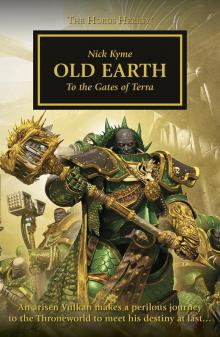 Old Earth
Old Earth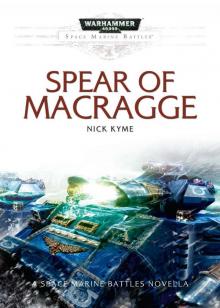 Spear of Macragge
Spear of Macragge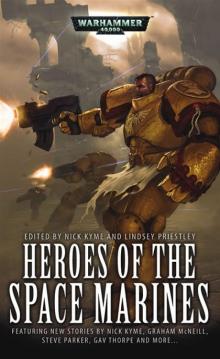 Heroes of the Space Marines
Heroes of the Space Marines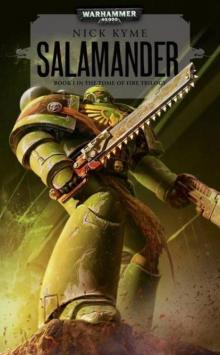 Salamander (warhammer 40000)
Salamander (warhammer 40000) The Gates of Terra
The Gates of Terra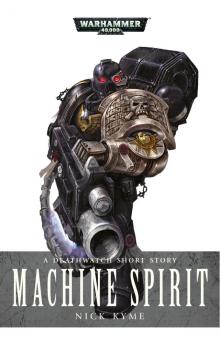 Machine Spirit
Machine Spirit Salamanders: Rebirth
Salamanders: Rebirth Scorched Earth
Scorched Earth Rebirth
Rebirth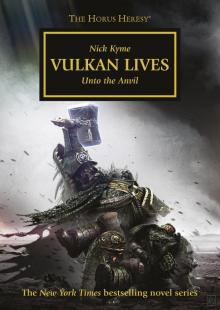 Vulkan Lives
Vulkan Lives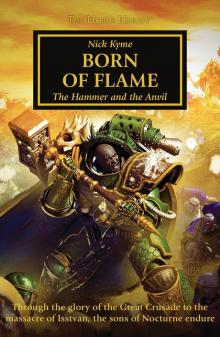 Born of Flame
Born of Flame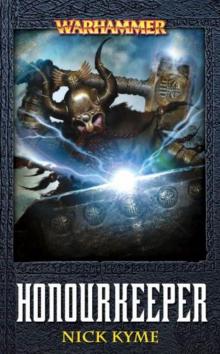 Honourkeeper
Honourkeeper